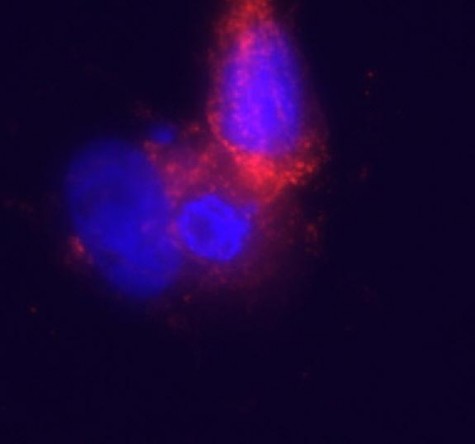News
New humanised antibodies to treat cancer
Published on 9 May 2012
UCLB has been working closely with Professor Kerry Chester and her colleagues from the UCL Cancer Institute to support the development of new humanised antibodies with potential to treat cancer.
In a collaboration enabled by UCLB, Professor Chester will work with scientists from the Therapeutic Antibody Group at MRC Technology (MRCT) to develop humanised forms of antibodies against the promising cancer targets carcinoembryonic antigen (CEA) and the alpha-v-beta-6 integrin.
CEA is present on a high proportion of colorectal cancers and other cancers of the gastrointestinal tract whilst alpha-v-beta-6 is present on various cancers, including pancreatic, oral, cervical and ovarian cancer, where it appears to have a role in the growth of malignant tumours.
The project is benefitting from access to MRCT’s considerable expertise and experience in antibody engineering where murine antibodies can be transformed into humanised drug-like molecules. Once humanised, the antibody is significantly less likely to be recognized by the patient’s own immune system, preventing it from being cleared too quickly and maximising its therapeutic effect on cancer cells. Current work supported by the Debbie Fund aims to validate the therapeutic potential of these antibodies in cervical cancer.
“We are absolutely delighted with progress of this project,” said Kerry Chester, the project’s lead investigator. “This generation of humanised antibodies in collaboration with MRCT brings us a significant step closer to a new treatment for patients with cervical cancers”.
These antibodies are being commercialised in collaboration with Cancer Research Technology, the technology transfer organisation of Cancer Research UK.
Image:Immunoflourescent staining of a cancer cells targeted with one of the antibodies developed for cervical cancer treatment. Antibody bound to cells is shown in red, nuclei of cells in blue.
About UCLB
UCLB is a leading technology transfer company that supports and commercialises research and innovations arising from UCL, one of the UK’s top research-led universities. UCLB has a successful track record and a strong reputation for identifying and protecting promising new technologies and innovations from UCL academics. It invests directly in development projects to maximise the potential of the research and manages the commercialisation process of technologies from the laboratory to market. UCLB supports UCL’s Grand Challenges of increasing UCL’s positive impact on and contribution to Global Health, Sustainable Cities, Intercultural Interaction and Human Wellbeing. For further information, please visit www.uclb.com
About The UCL Cancer Institute
The UCL Cancer Institute was established in 2007 and is the hub for cancer research at UCL. The Institute is located in the heart of London, and part of UCL The Cancer Institute is part of the Faculty of Medical Sciences, within the School of Life- and Medical Sciences. This School comprises the largest concentration of biomedical researchers in Europe. The Cancer Institute hosts the majority of cancer research at UCL, whilst other cancer activities across the UCL campus form part of a new Cancer Domain. The overall remit of the Institute is to develop a cancer presence and excellence, which rival other major national and international hubs for cancer research. For further information, please visit www.ucl.ac.uk/silva/cancer
About MRC Technology
MRC Technology (www.mrctechnology.org) is a technology transfer company responsible for translating cutting edge scientific discoveries into commercial products. MRC Technology adds value to cutting edge scientific discoveries through strategic patent protection and creative licensing of intellectual property (IP), through partnered research or through further scientific development. MRC Technology also has small molecule drug discovery and therapeutic antibody facilities, providing lead stage therapeutic assets to pharmaceutical and biotechnology companies.
About Debbie Fund
Debbie Fund is set up in memory of Debbie Phillips, who died of Cervical Cancer on 11th February 2010. During the progression of Debbie’s disease, it became apparent that there was no dedicated research into a drug treatment specifically for Cervical Cancer. Debbie Fund was set up to raise sufficient funds to ensure that the necessary research could be carried out by a team of scientists at University College London. Due to the amazing efforts of Debbie Fund’s supporters, research is already under way. For further information, please visit www.debbiefund.org
Print friendly version of New humanised antibodies to treat cancer



